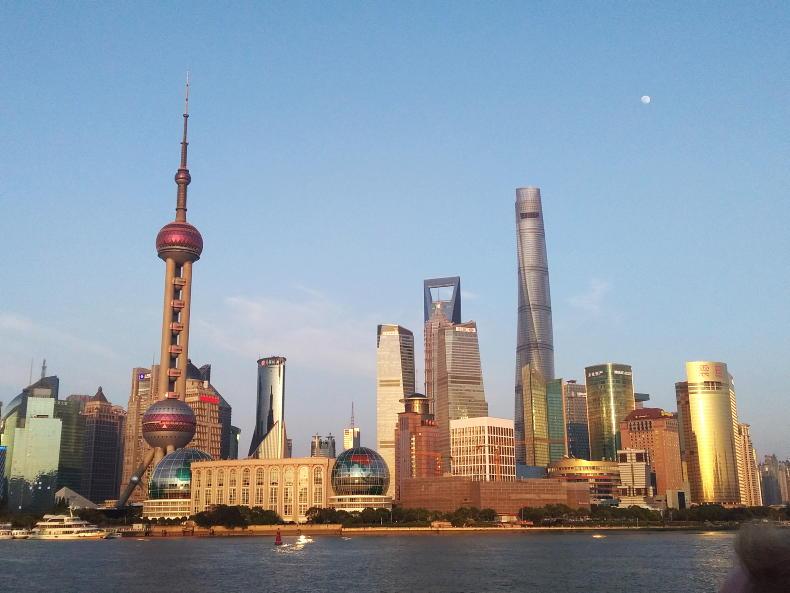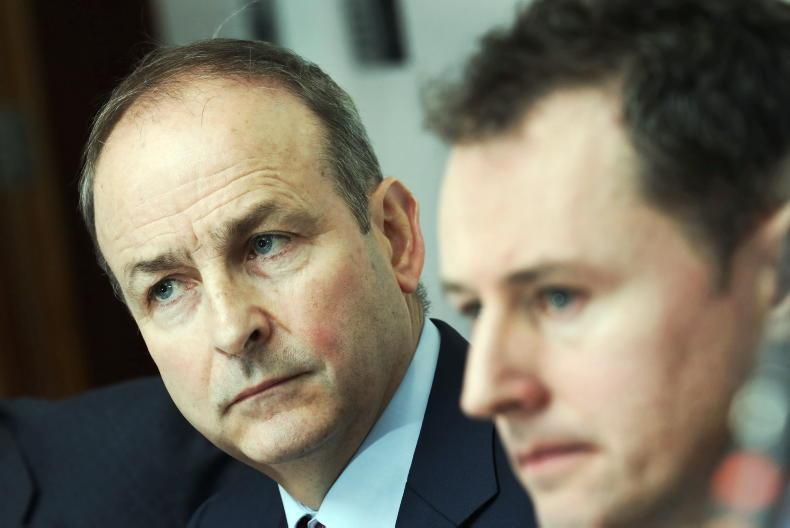An Taoiseach Micheál Martin has asked China’s head of government, premier Li Keqiang, to lift the current ban on Irish beef going to China “as a matter of urgency.”
In a letter, seen by the Irish Farmers Journal, the Taoiseach reminds the premier of his 2015 visit to Ireland when he and his wife, Professor Cheng Hong, visited the farm of Cathal and Mary Garvey in Gorthbrack, near Glencorrib, Co Mayo.
Micheál Martin also thanked Li Keqiang for the assistance Ireland received from China in rapidly sourcing personal protective equipment and other supplies in the early days of the coronavirus pandemic.
The Taoiseach went on to write:
“I want to draw one matter of concern to your attention. The Chinese market has been closed to Irish beef exports for over six months now, based on a single isolated case of atypical BSE last summer.
“The details of that case were fully explained at the time and further clarified in subsequent correspondence, which emphasised that there is no public health risk associated with this isolated and rare occurrence.
“Irish beef has proved very popular with Chinese consumers. The quality of the product is excellent, the partnership with Chinese distributors has been positive, and the supply chain has been safe and reliable. Our industry has worked very hard and formed very strong trading relationships with Chinese business.
“I value this relationship highly and I ask, therefore, that this temporary suspension be lifted as a matter of urgency.”
The Taoiseach signed his letter: “May this year of the Ox bring peace, health and prosperity.”
Suspension of trade
The Taoiseach’s intervention follows months of speculation about when trade in beef would resume.
In May 2020, a case of atypical BSE case was confirmed in a cow that died in Co Tipperary.
Ireland’s Department of Agriculture notified the Chinese authorities of the BSE case, in line with agreed protocol and this automatically triggered a temporary suspension of trade.
It was expected that the suspension would be short term, a matter of weeks, while the Chinese authorities made necessary checks.
However, weeks turned into months and Ireland’s beef exporters in recent weeks called for political intervention at the highest level.

On 13 January, Meat Industry Ireland director Cormac Healy described the almost eight-month suspension of Ireland’s beef exports to China as a “major loss to the entire beef sector in Ireland, just as sales to this exciting new market were set to ramp up”.
“Government efforts to secure a resumption of this new business is critical,” said Healy.
“The impasse has been prolonged beyond reason and it is now time for An Taoiseach to engage with his counterpart in China in order to move the process forward quickly towards a resolution.”
There has been intense communication between Irish and Chinese authorities at government, diplomatic and at a technical level
Speaking at a Bord Bia seminar last week, Sinéad McPhillips, assistant secretary general at the Department of Agriculture said its overriding priority was to regain access for beef to the Chinese market.
“There has been intense communication between Irish and Chinese authorities at government, diplomatic and at a technical level and we are confident that we will regain access,” she said.
It is understood that Minister for Agriculture Charlie McConalogue contacted the Taoiseach earlier this week about the ongoing beef suspension.
Chinese beef demand
Chinese meat imports hit 10 million tonnes (mt) in 2020, with beef making up 2.5mt of this.
The Chinese GDP is forecast to grow by 8% in 2020 and meat consumption will track this,
Conor O’Sullivan from Bord Bia’s office in Shanghai said in its latest webinar.
Last year, 300,000 Chinese families made an online purchase of Irish beef in 2020, he noted.
“The more money the Chinese have, the more money they will spend on meat,” he said.

Conor O'Sullivan, Bord Bia's markets specialist in China
China imported just over 10,000t of Irish beef in 2018 and had got off to a strong start in 2020, with just under 3,000t exported in the first three months of the year prior to the current suspension.
Since the COVID-19 pandemic, Chinese consumers are eating foods that are seen to boost their immunity, and meat and dairy proteins have been promoted as a way to fend off disease.
An Taoiseach Micheál Martin has asked China’s head of government, premier Li Keqiang, to lift the current ban on Irish beef going to China “as a matter of urgency.”
In a letter, seen by the Irish Farmers Journal, the Taoiseach reminds the premier of his 2015 visit to Ireland when he and his wife, Professor Cheng Hong, visited the farm of Cathal and Mary Garvey in Gorthbrack, near Glencorrib, Co Mayo.
Micheál Martin also thanked Li Keqiang for the assistance Ireland received from China in rapidly sourcing personal protective equipment and other supplies in the early days of the coronavirus pandemic.
The Taoiseach went on to write:
“I want to draw one matter of concern to your attention. The Chinese market has been closed to Irish beef exports for over six months now, based on a single isolated case of atypical BSE last summer.
“The details of that case were fully explained at the time and further clarified in subsequent correspondence, which emphasised that there is no public health risk associated with this isolated and rare occurrence.
“Irish beef has proved very popular with Chinese consumers. The quality of the product is excellent, the partnership with Chinese distributors has been positive, and the supply chain has been safe and reliable. Our industry has worked very hard and formed very strong trading relationships with Chinese business.
“I value this relationship highly and I ask, therefore, that this temporary suspension be lifted as a matter of urgency.”
The Taoiseach signed his letter: “May this year of the Ox bring peace, health and prosperity.”
Suspension of trade
The Taoiseach’s intervention follows months of speculation about when trade in beef would resume.
In May 2020, a case of atypical BSE case was confirmed in a cow that died in Co Tipperary.
Ireland’s Department of Agriculture notified the Chinese authorities of the BSE case, in line with agreed protocol and this automatically triggered a temporary suspension of trade.
It was expected that the suspension would be short term, a matter of weeks, while the Chinese authorities made necessary checks.
However, weeks turned into months and Ireland’s beef exporters in recent weeks called for political intervention at the highest level.

On 13 January, Meat Industry Ireland director Cormac Healy described the almost eight-month suspension of Ireland’s beef exports to China as a “major loss to the entire beef sector in Ireland, just as sales to this exciting new market were set to ramp up”.
“Government efforts to secure a resumption of this new business is critical,” said Healy.
“The impasse has been prolonged beyond reason and it is now time for An Taoiseach to engage with his counterpart in China in order to move the process forward quickly towards a resolution.”
There has been intense communication between Irish and Chinese authorities at government, diplomatic and at a technical level
Speaking at a Bord Bia seminar last week, Sinéad McPhillips, assistant secretary general at the Department of Agriculture said its overriding priority was to regain access for beef to the Chinese market.
“There has been intense communication between Irish and Chinese authorities at government, diplomatic and at a technical level and we are confident that we will regain access,” she said.
It is understood that Minister for Agriculture Charlie McConalogue contacted the Taoiseach earlier this week about the ongoing beef suspension.
Chinese beef demand
Chinese meat imports hit 10 million tonnes (mt) in 2020, with beef making up 2.5mt of this.
The Chinese GDP is forecast to grow by 8% in 2020 and meat consumption will track this,
Conor O’Sullivan from Bord Bia’s office in Shanghai said in its latest webinar.
Last year, 300,000 Chinese families made an online purchase of Irish beef in 2020, he noted.
“The more money the Chinese have, the more money they will spend on meat,” he said.

Conor O'Sullivan, Bord Bia's markets specialist in China
China imported just over 10,000t of Irish beef in 2018 and had got off to a strong start in 2020, with just under 3,000t exported in the first three months of the year prior to the current suspension.
Since the COVID-19 pandemic, Chinese consumers are eating foods that are seen to boost their immunity, and meat and dairy proteins have been promoted as a way to fend off disease.








 This is a subscriber-only article
This is a subscriber-only article










SHARING OPTIONS: